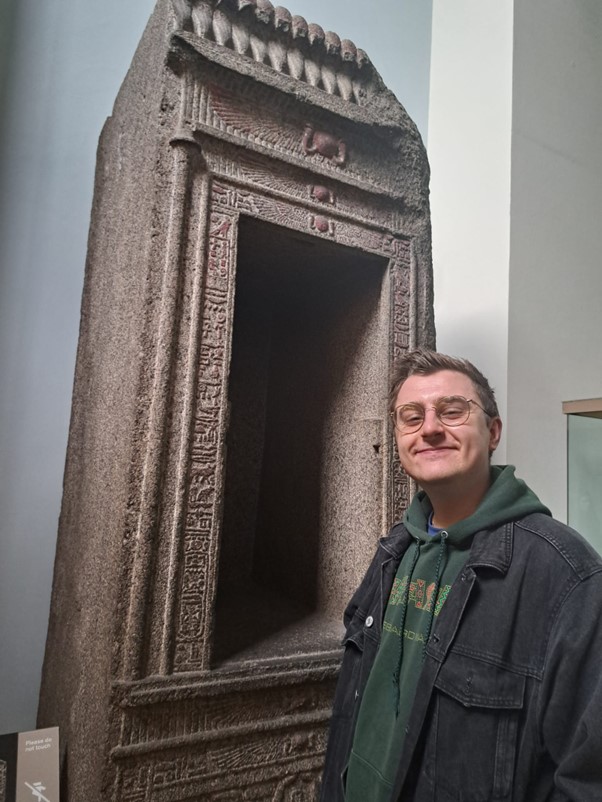Occupational Therapy Student Story: Dan Egelstaff

Dan Egelstaff is a First Year student on the MSc Occupational Therapy (pre-registration) course. The degree at Health Sciences University appealed to Dan when he was working as a Learning Disabilities Support Worker during the Covid-19 pandemic.
Dan hadn’t intended on pursuing a career in healthcare, having originally studied for a degree in English Literature. He loved his job as a Support Worker so much, however, that he decided to study to become an Occupational Therapist.
A Career in Occupational Therapy
“Occupational therapists support people to live their lives as independently, comfortably, and hopefully as happily as possible, doing the things that are most important to them.
“The scope is so broad, which is one of the fantastic things about occupational therapy. You could work with someone of any age, from any background, anywhere across the world and with a variety of different diagnoses, conditions or needs.
“That’s one of the things that first attracted me to study occupational therapy. What makes it exciting is the fact that I can make a real difference in someone’s life. I am part of the process that can help them get back to the place they want to be.”
Why Occupational Therapy is Important
“It’s so important because it’s part of someone’s process through to healing if they’ve had an acute injury or illness or been unwell; it’s part of someone’s journey to get back to where they need to be. Occupational therapists play a key role in the multidisciplinary team of doctors, nurses, physiotherapists and many more that help people to recover and get back to their lives.”
What Makes a Good Occupational Therapist
“You’ve got to have a very high level of empathy. You’ve got to have both problem-solving skills and the ability to think outside the box as well. You’ve also got to be able to communicate well, both verbally and written, and be a team player as there is a lot of collaboration with other people. You’ve got to have good advocacy and leadership skills. Linked in with that, you’ve got to stand up for both your patients and your profession.”
What Drew Dan to this Profession
“I worked as a support worker in learning disabilities as a stopgap after graduating from an English literature degree, which was right in the middle of the Covid-19 pandemic. It was so I could figure out what I was going to do next. I loved it so much it was meant to be for six months to a year. I ended up doing it for four years! My mum, who’s a psychiatric nurse, thought that Occupational Therapy might resonate with me. The more I read up about it, the more I liked it and thought it suited me. I love helping people and working with people and for me it is the next step in order to be able to do that.”
Dan’s Placements
“I’ve been on two placements already. One was in the mental health inpatient rehabilitation unit at a local trust hospital in Portsmouth and then one at the stroke unit at another local trust hospital. I thoroughly enjoyed both and I would say the placements are probably one of, if not the best, things about the course. It’s so fantastic to be able to apply your theory to the real world. You learn so much because of the practical experience.
“The mental health placement was in a small unit. I worked with an Occupational Therapist with years of experience. My placement on the stroke unit was in a huge team, with many physiotherapists, other therapy staff and doctors, with a much younger dynamic.
“It was fabulous to work with two occupational therapists at two different stages of their careers and learn as much from them as possible. That variety was key to my learning because the placement helped me contextualise the day-to-day role of an occupational therapist, and what the average working day is like.”
Dan’s Highlights So Far
“The placements are a highlight. I also really like the variety of different teaching methods employed at HSU. When I studied English Literature, it was very formulaic. We went to a lecture and then you had a two-hour seminar afterwards. And that was it.
“At HSU, they have much more study-led learning, which I enjoy, and think is tremendously beneficial. It links back to being a team player and working with those communication skills as well.
“There are a variety of guest speakers coming in from different areas and recently we had a field trip to the Hand Therapy Unit at a local trust hospital. The course is always interesting. Both the occupational therapy academics on the course are incredibly experienced and knowledgeable and really good tutors, and you can tell they care. They are passionate about their field and educating and they are there for the students when needed.”
You can find out more about the MSc Occupational Therapy (pre-registration) course here.